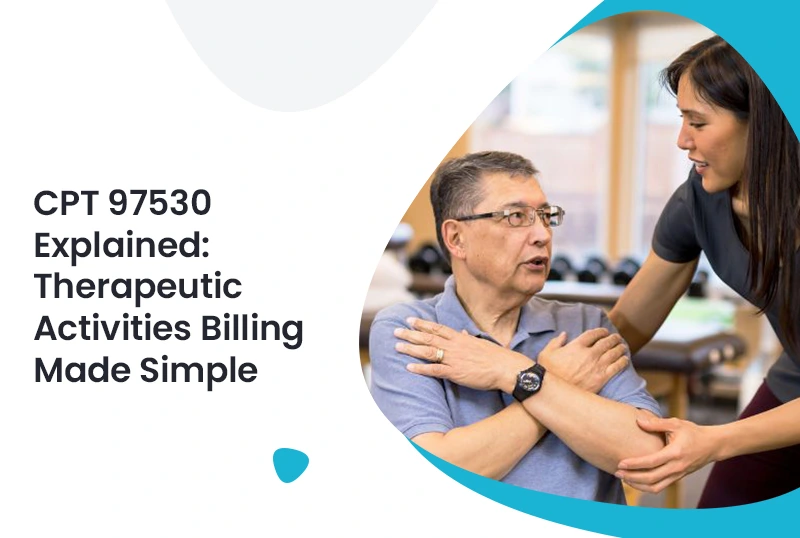The 97530 CPT code is widely used in rehabilitation therapy to bill for dynamic therapeutic activities. Designed to capture skilled interventions that improve functional performance, this code is critical for proper reimbursement. Whether you’re a physical therapist, occupational therapist, or medical biller, understanding how to use CPT 97530 can dramatically reduce claim denials and optimize revenue.
At the forefront of medical credentialing services, ensuring accurate coding and documentation is essential. This article will break down the requirements, documentation tips, common challenges, and billing guidelines related to CPT 97530 to help your practice succeed.
What Is CPT Code 97530?
CPT 97530 refers to “Therapeutic activities, direct (one-on-one) patient contact (use of dynamic activities to improve functional performance), each 15 minutes.” It is typically used to document active interventions that include bending, lifting, reaching, throwing, or any other physical task requiring coordinated movement.
This code should not be used interchangeably with exercise codes like 97110. The primary differentiator is the functional, task-oriented nature of 97530 sessions. These activities are often designed to simulate real-life scenarios to improve patient mobility and strength.
When to Use the 97530 CPT Code
Use the 97530 CPT code when performing dynamic therapeutic activities that are directly related to improving a patient’s functional ability. Examples include:
- Lifting weighted objects to simulate job functions
- Balance board tasks to improve stability
- Reach and grasp exercises for ADLs (activities of daily living)
- Transfer training, such as moving from bed to wheelchair
To support billing for 97530, therapists must provide documentation that clearly states:
- The specific activity performed
- Its purpose and expected outcome
- Time spent in direct one-on-one contact
Without this, reimbursement may be denied due to lack of medical necessity or insufficient documentation.
Read more here: Billing and Coding Services for Somerset Family Practice: What to Expect
97530 CPT Code Billing Guidelines
Correct use of CPT 97530 starts with understanding its timed nature. Each unit equals 15 minutes of direct patient contact. According to Medicare’s 8-minute rule, the following applies:
- 8–22 minutes = 1 unit
- 23–37 minutes = 2 units
- 38–52 minutes = 3 units
- 53–67 minutes = 4 units
In addition, this code cannot be billed on the same day with certain CPT codes (like 97110) without supporting documentation that differentiates the services. Proper modifiers, such as modifier 59, may also be needed to indicate separate services.
Practices that incorporate strong Revenue Cycle Management systems are better equipped to track these requirements and avoid billing pitfalls. Integration of EMR systems and audit-ready documentation supports faster reimbursement.
97530 CPT Code Reimbursement Rates
The national average Medicare reimbursement rate for CPT 97530 ranges from $32 to $40 per unit, depending on location and other modifiers. Commercial payers may vary, but this CPT code remains one of the higher reimbursed therapy services due to its complexity and function-driven focus.
Accurate charge capture and proper coding are vital. Misuse or overuse of CPT 97530 can trigger payer audits or denials. Ensure each session is skill-based and justified by a treatment plan.
97530 CPT Code vs 97110: Know the Difference
One of the biggest billing errors happens when 97530 CPT code is used instead of 97110, or vice versa. Here’s how to distinguish:
| Feature | CPT 97530 | CPT 97110 |
| Focus | Functional task training | Therapeutic exercises |
| Activity Type | Dynamic, full-body movement | Repetitive motion exercises |
| Goal | Improve real-life functioning | Improve strength/range |
| Documentation Needed | Task specificity + purpose | Exercise details + duration |
Knowing when to use each code ensures your practice stays compliant and avoids unnecessary audits.
Documentation Tips for CPT Code 97530
To ensure clean claims, document:
- The activity performed (e.g., transfer from bed to chair using grab bars)
- The purpose (e.g., increase independence with ADLs)
- The patient’s response (e.g., tolerated well, improved balance noted)
- Total one-on-one time
Avoid vague statements like “patient engaged in exercises.” Be specific and task-oriented.
Midway through managing these claims, aligning with strong medical billing coding protocols ensures consistency. Coders should be trained to interpret therapist notes and convert them into clean, payable claims.
Common Mistakes to Avoid
- Underdocumenting sessions – Lacking clinical reasoning or specificity.
- Overcoding time – Counting setup or rest periods as billable time.
- Using with conflicting codes – Billing alongside 97110 without proper justification.
- Failing to justify medical necessity – Not linking the activity to a functional deficit.
Auditors often flag 97530 because it tends to be higher reimbursed. A robust internal review process will reduce errors and increase payment rates.
How to Streamline 97530 CPT Code Billing
- Conduct regular documentation audits
- Train staff on time-based CPT rules
- Invest in billing software that auto-checks modifiers
- Collaborate with credentialed professionals
- Stay updated on payer-specific rules
In the final phase, pairing precise documentation with the right medical credentialing services can ensure your providers are eligible, licensed, and fully reimbursable. The better your credentialing, the fewer denials you’ll encounter.
Final Thoughts
The 97530 CPT code is essential for capturing therapeutic interventions that promote real-world function and patient independence. With accurate documentation, adherence to billing rules, and strong collaboration between providers and coders, practices can ensure proper reimbursement and compliance.
As part of a proactive strategy, incorporating services like (RCM) and up-to-date medical billing coding practices will set your clinic apart.
For precision-driven coding, trust experts who know the nuances Precision Hub is here to support you with unmatched accuracy and compliance.
FAQs (Frequently Ask Question)
Q1: What does the 97530 CPT code cover?
A: It covers dynamic therapeutic activities aimed at improving functional performance, such as lifting, balance training, and transfer tasks.
Q2: How many units can I bill for CPT 97530?
A: You can bill based on 15-minute increments following Medicare’s 8-minute rule. Up to 4 units depending on time spent.
Q3: Can I bill 97530 with 97110?
A: Yes, but you must differentiate services clearly and may need modifier 59.
Q4: Is CPT 97530 covered by Medicare?
A: Yes, but you must meet documentation standards and demonstrate medical necessity.
Q5: What is the average reimbursement for 97530?
A: Medicare reimburses between $32–$40 per unit, but commercial payer rates may differ.







